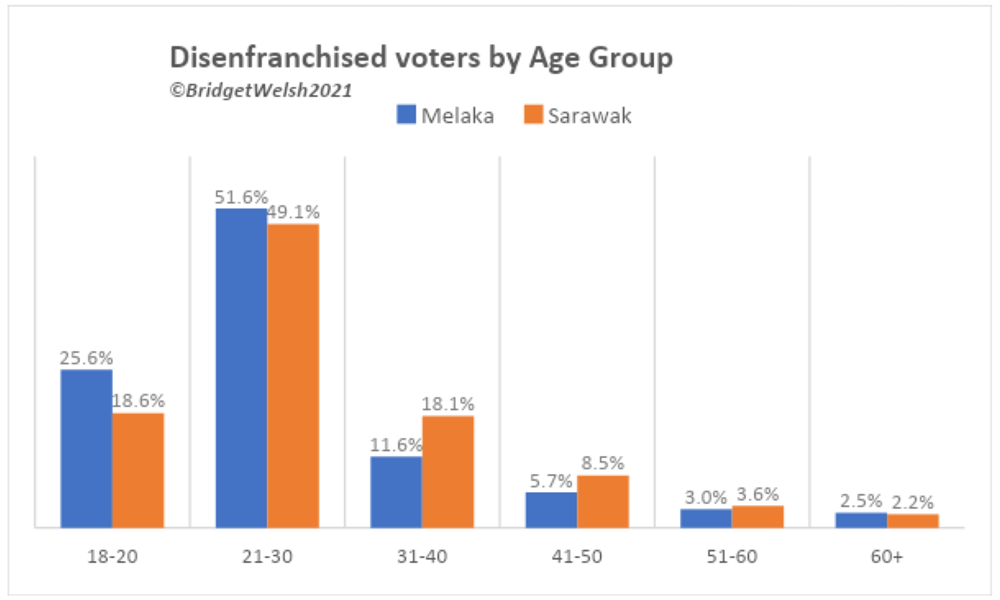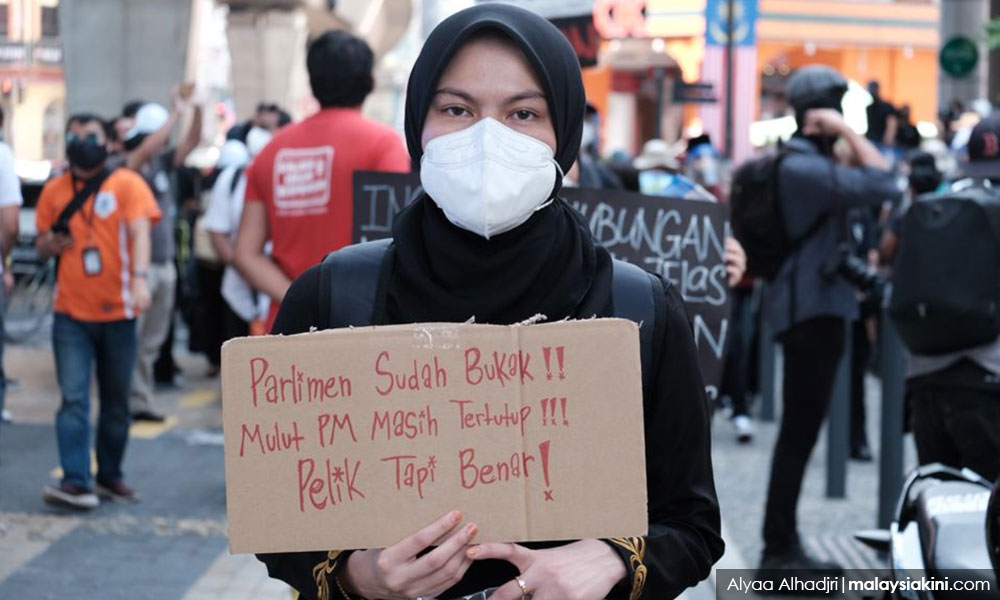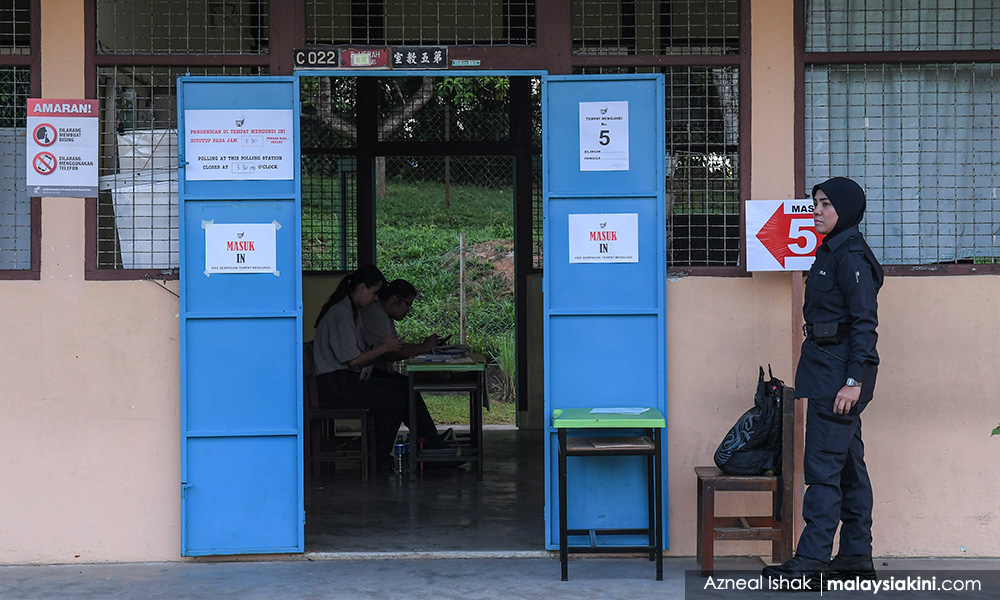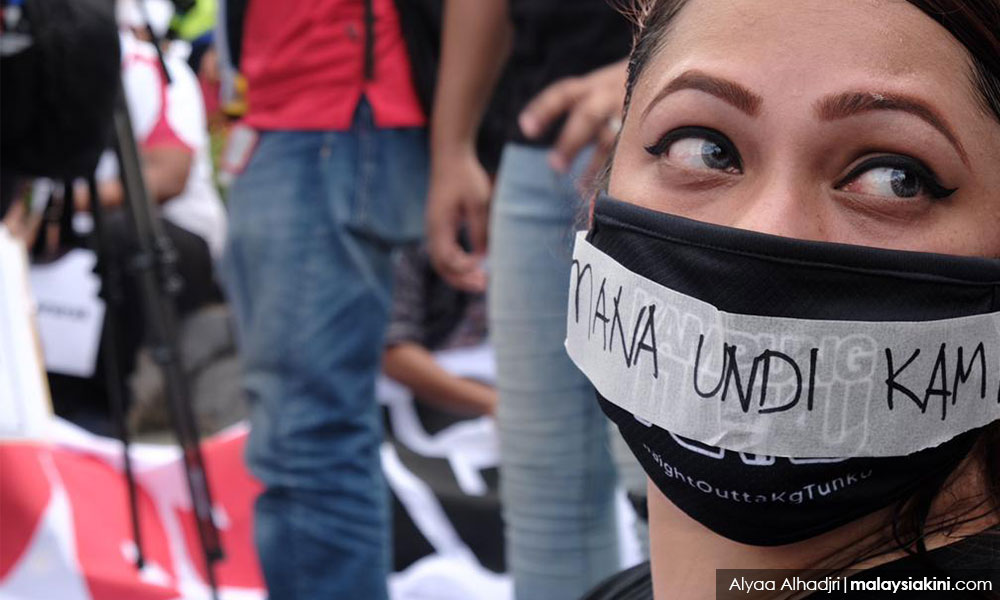Over two years ago, Malaysia passed important constitutional amendments reducing the voting age to 18 from 21 and introducing automatic voter registration, thereby assuring that those who were not able to register could vote. These changes were arguably the most impactful democratic reform in Malaysia in the last decade, enfranchising millions who had not been able to vote due to legal and administrative obstacles in the system.
Over the last month, it has become blatantly obvious that not only did the Election Commission (EC) fail in its fiduciary duty to citizens to bring about the necessary administrative changes associated with the amendments in a timely manner, it is now opting to intentionally disenfranchise and disempower thousands of Malaysians, especially young Malaysians, from voting in the coming state polls in Malacca and Sarawak.
This comes after the EC has repeatedly ignored calls for timely safer remote and postal voting in post-GE14 by-elections and Sabah’s 2020 state election, unnecessarily and irresponsibly endangering citizens in a pandemic that remains serious. The current leadership of EC chairperson Abdul Ghani Salleh - a man who was removed from the commission earlier due to concerns about professionalism of the pre-2018 EC - appears resistant to reform and unwilling to bring the agency’s practices in line with international standards of electoral conduct.
Mass voter exclusion
Based on the electoral roll that the EC posted on its website last month (October), which included the composition of new voters in each seat, an estimated over 825,000 people are being intentionally disenfranchised (estimated 151,961 in Malacca and 674,732 in Sarawak for a total of 826,693).
To put in context, this is 3.7% of the (2020) adult national population - not a small share. It is however far smaller than the number the government managed to impressively vaccinate in a short period of time. As evident of the posting of the most-updated electoral roll, the EC has already identified potential voters on the rolls, thus making their inclusion a simple administrative matter - if they genuinely respected the rights of those being excluded. For now, however the EC is relying on an earlier roll without the new voters for the coming polls.

The composition of those being excluded varies in the two states in question, Malacca and Sarawak. There are two groups, 18-21 voters who are being allowed to vote, and those above 21 who are automatically registered to vote, known to the government through the location on their identification cards. The latter automated registrants above 21 are the majority of potential new voters, 74.4% in Malacca and 81.4% in Sarawak respectively. The most disenfranchised at those in their 20s.
While it can be argued that those to be automatically registered had an opportunity to do so before, the pandemic has slowed registration, especially as voters would have the expectation of their inclusion on the electoral roll much earlier if the EC had acted in good faith to implement the 2019 constitutional amendments in a timely manner. The reason automatic registration was introduced was recognition of the need to remove administrative barriers to voters. Importantly, Sarawak has been among the most negatively affected by administrative barriers for registration, given its rural and remote areas.
These excluded voters, 18 and above, both men and women, represent all of the communities in Malaysia, but comprise a majority of Malays (62% in Malacca) and bumiputera (75% both Muslim and non-Muslim in Sarawak). Ironically, the incumbent governments in these states that appeal to race are mostly disenfranchising voters in their traditional ethnic base of support.
Voter disenfranchisement is being compounded by the fact that many voters in these states live outside/outstation (estimated 15% in Malacca and 20% in Sarawak) and there are inadequate alternative measures for voters to vote remotely or through postal ballots.

Fear of the young known
This voter exclusion is apparently driven by primarily political considerations. The incumbent government Umno-PN, whose leaders earlier openly spoke of delaying the implementation of the amendments before Undi18 went to court to challenge the delay in Sarawak, showed its hand of hesitation earlier this year.
Young voters have traditionally not been to the incumbents’ advantage, as they were decisive in Umno/BN’s defeat in GE14 in 2018 and underscored the gains made in the 2011 state election and GE14 seats in Sarawak.
With the uncertainty of Covid and the disproportionate impact of the pandemic on the livelihoods of younger Malaysians - highest youth unemployment, displacement in education and inadequate youth social safety nets - the incumbents have good reason to be concerned about youth voter discontent. The lack of prominent youth leaders under 30 in the government (including from Umno) also compounds the lack of connectivity to this decisive group of voters.
While the average number of new voters per seat in Malacca and Sarawak would have been 4,500 and 8,200 respectively, bringing in almost a new third of voters into the electorate of each state, the electoral impact of the currently disenfranchised electorate varied across seats. Some seats such as Paya Rumput (13,000 potential new voters) in Malacca and Senadin (33,000 potential new voters) in Sarawak have experienced significant population growth tied to new housing and, as such, the addition of the excluded voters would have been profoundly transformed in composition.

Across both states, the entrant of disenfranchised voters would have made seats more competitive overall, and in only an exception of a handful of cases in both states, the number of disenfranchised voters would have exceeded the electoral majority in the previous election (GE14 in Malacca, Sarawak 2016 state election). The new voters would have made the election a very different terrain – they would have been a game-changer in a context where the decision has been to game ongoing changes.
Inclusion of new voters also had the potential to disadvantage the Umno/PN government’s fortunes, which has not performed as well with younger voters in most earlier elections. To illustrate the electoral impact of these new voters and based on even a conservative trajectory scenario of previous youth voting patterns, Umno/PN would potentially face the risk of losing five of the Malacca state seats it held from GE14 (Lendu, Pantai Kundor, Rim, Merlimau and Sungai Rambai) if it included the now disenfranchised voters. Other seats would have also become more competitive in Malacca, where the contests are even closer than most of the seats in Sarawak.
The political reasoning seems clear, but it is short-term. The current incumbents have lost an opportunity to engage these voters to win over their support. The disenfranchised voters are supposed to come on the rolls before GE15. Now the incumbent government has potentially alienated these voters unnecessarily and given the opposition an electoral issue. Voter exclusion has backfired on the incumbent governments in the past, in GE12 2008 for example when a decision was made to exclude large number of voters.
Lost youth engagement opportunity
The system as a whole has also lost an opportunity for broader political engagement. Given the changing Covid context, controversies over the Pakatan Harapan in government and PAS’ changing alliances, the youth support for these parties was not a given. They would have also had to work for their support. Including young and other disenfranchised voters was and remains an opportunity to strengthen the base of political parties and expand needed engagement with the electorate.

Sadly, the exclusion of these voters erodes confidence in the EC which has not adequately met its administrative responsibilities and in its position reporting to the Prime Minister’s Office has given the impression of putting politics before the people.
It is not too late to change the electoral roll to include these disenfranchised voters. This is the right thing to do, to allow a mandate from all voters in these states that are constitutionally allowed to vote. Malacca’s numbers 151,000 are already known to the EC and can be easily included. The date of Sarawak’s polls has yet to be set. This is largely a matter of political and administrative will.
Doing the right thing, especially after the difficulties of the pandemic for young people, sets Malaysia on a healthier political path. - Mkini
BRIDGET WELSH is a senior research associate at the Hu Fu Centre for East Asia Democratic Studies and a senior associate fellow of The Habibie Centre. She currently is an honorary research associate of the University of Nottingham, Malaysia's Asia Research Institute (Unari) based in Kuala Lumpur. She tweets at @dririshsea.
The views expressed here are those of the author/contributor and do not necessarily represent the views of MMKtT.




No comments:
Post a Comment
Note: Only a member of this blog may post a comment.